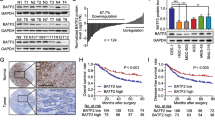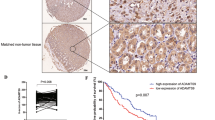Abstract
Background
The ALEX is a novel member of the armadillo family and ALEX1 was reported to be reduced or even lost in multiple solid tumors. However, its expression profile and oncogenic role in gastric cancer (GC) remains largely unknown.
Methods
ALEX1 expression was detected in 161 GC samples by immunohistochemistry staining. NCI-N87 cells transfected by ALEX1 lentivirus vectors and MKN28 cells transfected by ALEX1 shRNA were used for biological function investigation. Western blot was applied to explore the molecular mechanism and pull-down assays were applied to measure the activity of Rho GTPases. In vivo tumorigenicity, peritoneal and lung metastasis experiments were performed by tumor cell engraftment into nude mice. Bisulfite genomic sequencing and methylation-specific PCR were applied to check the methylation status of the ALEX1 gene.
Results
The expression rate of ALEX1 was significantly reduced in gastric tumor samples compared to non-tumor samples (43.5 vs. 90.2%), and its expression was closely related to the tumor differentiation, TNM staging, and lymph nodes metastasis. ALEX1 overexpression in NCI-N87 cells significantly inhibited cell proliferation, migration, and invasion in vitro, and disrupted the structure of the cytoskeleton. ALEX1 overexpression attenuated xenografts growth, peritoneal, and lung metastasis in nude mice. Mechanistically, the overexpression of ALEX1 inhibits thrombin-induced metastasis and Rho GTPases activation. Bisulfite genomic sequencing and methylation-specific PCR revealed that the promoter of ALEX1 is highly methylated in GC cells and tissues.
Conclusions
ALEX1 expression is reduced in GC and is involved in diverse cellular functions. ALEX1 inhibits metastasis through the PAR-1/Rho GTPase signaling pathway.






Similar content being viewed by others
Abbreviations
- GC:
-
Gastric cancer
- ALEX:
-
Arm protein lost in epithelial cancers, on chromosome X
- PAR-1:
-
Protease-activated receptor 1
- Rho GTPase:
-
Rho family of GTPase
- EMT:
-
Epithelial-to-mesenchymal transition
- CCK-8:
-
Cell Counting Kit-8
- MSP:
-
Methylation-specific PCR
- IHC:
-
Immunohistochemistry
- qRT-PCR:
-
Quantitative reverse transcription-polymerase chain reaction
References
Fitzmaurice C, Dicker D, Pain A, et al. The global burden of cancer 2013. JAMA Oncol. 2015;1(4):505–27.
Van Cutsem E, Sagaert X, Topal B, et al. Gastric cancer. Lancet. 2016;388(10060):2654–64.
Hall A. The cytoskeleton and cancer. Cancer Metastasis Rev. 2009;28(1–2):5–14.
Sahai E, Marshall CJ. RHO-GTPases and cancer. Nat Rev Cancer. 2002;2(2):133–42.
Fukata M, Nakagawa M, Kaibuchi K. Roles of Rho-family GTPases in cell polarisation and directional migration. Curr Opin Cell Biol. 2003;15(5):590–7.
Shi XL, Gangadharan B, Brass LF, et al. Protease-activated receptors (PAR1 and PAR2) contribute to tumor cell motility and metastasis. Mol Cancer Res. 2004;2(7):395–402.
Spiegelberg BD, Hamm HE. Roles of G-protein-coupled receptor signaling in cancer biology and gene transcription. Curr Opin Genet Dev. 2007;17(1):40–4.
Fujimoto D, Hirono Y, Goi T, et al. The activation of Proteinase-Activated Receptor-1 (PAR1) mediates gastric cancer cell proliferation and invasion. BMC Cancer. 2010;10:443.
Pan Y, Bi F, Liu N, et al. Expression of seven main Rho family members in gastric carcinoma. Biochem Biophys Res Commun. 2004;315(3):686–91.
Du T, Qu Y, Li J, et al. Maternal embryonic leucine zipper kinase enhances gastric cancer progression via the FAK/Paxillin pathway. Mol Cancer. 2014;13(1):100.
Kurochkin IV, Yonemitsu N, Funahashi SI, et al. ALEX1, a novel human armadillo repeat protein that is expressed differentially in normal tissues and carcinomas. Biochem Biophys Res Commun. 2001;280(1):340–7.
Hatzfeld M. The armadillo family of structural proteins. Int Rev Cytol. 1999;186:179–224.
Gao Y, Wu JY, Zeng F, et al. ALEX1 regulates proliferation and apoptosis in breast cancer cells. Asian Pac J Cancer Prev. 2015;16(8):3293–9.
Iseki H, Takeda A, Andoh T, et al. ALEX1 suppresses colony formation ability of human colorectal carcinoma cell lines. Cancer Sci. 2012;103(7):1267–71.
Zender L, Xue W, Zuber J, et al. An oncogenomics-based in vivo RNAi screen identifies tumor suppressors in liver cancer. Cell. 2008;135(5):852–64.
Liu X, Tang X, Zhang S, et al. Methylation and expression of retinoblastoma and transforming growth factor-beta1 genes in Epstein-Barr virus-associated and -negative gastric carcinomas. Gastroenterol Res Pract. 2012;2012:906017.
Otsuki T, Fujimoto D, Hirono Y, et al. Thrombin conducts epithelial–mesenchymal transition via proteasea-ctivated receptor1 in human gastric cancer. Int J Oncol. 2014;45(6):2287–94.
Fujimoto D, Hirono Y, Goi T, et al. The activation of proteinase-activated receptor-1 (PAR1) promotes gastric cancer cell alteration of cellular morphology related to cell motility and invasion. Int J Oncol. 2013;42(2):565–73.
Calcagno DQ, Gigek CO, Chen ES, et al. DNA and histone methylation in gastric carcinogenesis. World J Gastroenterol. 2013;19(8):1182–92.
McCarthy N. Epigenetics: worth another look? Nat Rev Cancer. 2012;12(1):2.
Mou Z, Tapper AR, Gardner PD. The armadillo repeat-containing protein, ARMCX3, physically and functionally interacts with the developmental regulatory factor Sox10. J Biol Chem. 2009;284(20):13629–40.
Smith CA, McClive PJ, Sinclair AH. Temporal and spatial expression profile of the novel armadillo-related gene, Alex2, during testicular differentiation in the mouse embryo. Dev Dyn. 2005;233(1):188–93.
Weber GF, Bronson RT, Ilagan J, et al. Absence of the CD44 gene prevents sarcoma metastasis. Cancer Res. 2002;62(8):2281–6.
Lefebvre O, Chenard MP, Masson R, et al. Gastric mucosa abnormalities and tumorigenesis in mice lacking the pS2 trefoil protein. Science. 1996;274(5285):259–62.
Talmadge JE, Fidler IJ. AACR centennial series: the biology of cancer metastasis: historical perspective. Cancer Res. 2010;70(14):5649–69.
Kim SJ, Shin JY, Lee KD, et al. Galectin-3 facilitates cell motility in gastric cancer by up-regulating protease-activated receptor-1 (PAR-1) and matrix metalloproteinase-1 (MMP-1). PLoS One. 2011;6(9):e25103.
Boire A, Covic L, Agarwal A, et al. PAR1 is a matrix metalloprotease-1 receptor that promotes invasion and tumorigenesis of breast cancer cells. Cell. 2005;120(3):303–13.
Martin CB, Mahon GM, Klinger MB, et al. The thrombin receptor, PAR-1, causes transformation by activation of Rho-mediated signaling pathways. Oncogene. 2001;20(16):1953–63.
Greenberg DL, Mize GJ, Takayama TK. Protease-activated receptor mediated RhoA signaling and cytoskeletal reorganization in LNCaP cells. Biochemistry. 2003;42(3):702–9.
Rossman KL, Der CJ, Sondek J. GEF means go: turning on RHO GTPases with guanine nucleotide-exchange factors. Nat Rev Mol Cell Biol. 2005;6(2):167–80.
Jones PA, Baylin SB. The epigenomics of cancer. Cell. 2007;128(4):683–92.
Li Y, Liang J, Hou P. Hypermethylation in gastric cancer. Clin Chim Acta. 2015;448:124–32.
Tahara T, Arisawa T. DNA methylation as a molecular biomarker in gastric cancer. Epigenomics. 2015;7(3):475–86.
Niwa T, Tsukamoto T, Toyoda T, et al. Inflammatory processes triggered by Helicobacter pylori infection cause aberrant DNA methylation in gastric epithelial cells. Cancer Res. 2010;70(4):1430–40.
Acknowledgements
We thank Dr. Wen-tao Dai for his help in statistical analysis. This study was supported by grants from National Natural Science foundation of China (No. 91529302, No. 81572798), and The National Key Technology R&D Program of China (No. 2014BAI09B03).
Author information
Authors and Affiliations
Corresponding author
Ethics declarations
Conflict of interest
The authors declare that they have no conflicts of interest.
Electronic supplementary material
Below is the link to the electronic supplementary material.
Rights and permissions
About this article
Cite this article
Pang, L., Li, Jf., Su, L. et al. ALEX1, a novel tumor suppressor gene, inhibits gastric cancer metastasis via the PAR-1/Rho GTPase signaling pathway. J Gastroenterol 53, 71–83 (2018). https://doi.org/10.1007/s00535-017-1329-y
Received:
Accepted:
Published:
Issue Date:
DOI: https://doi.org/10.1007/s00535-017-1329-y




